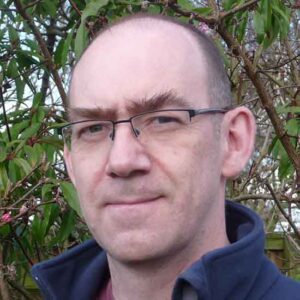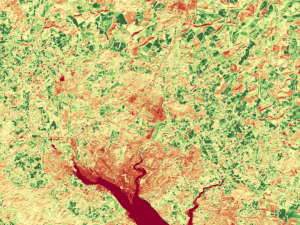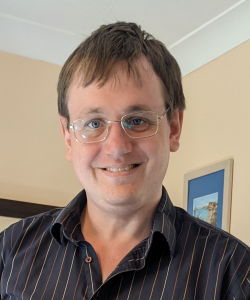Tuesday 18th March 2025 from 19:00 for 19:30
Abingdon United Football Club (Northcourt Rd, OX14 1PL, Abingdon)
This talk is part of the 2025 ATOM Festival of Science & Technology.
Macular Degeneration can occur at any age. It may be inherited or caused by degenerative, infective, inflammatory, toxic or other processes. Descriptions of the retina were recorded probably the earliest in 300-400 BCE, and since then imaging technology has revolutionised our ability to visualise the retina in health and disease. Numerous conditions affecting the macula have been described.
 The macula is the central part of the retina, which is located at the back of the eye, and measures about 5mm across. Its presence enables us to see print, recognise faces and distinguish colours and detail. Different modalities have enabled high resolution imaging of the macula, its components, and any structural changes. Innovations in functional assessment have contributed to the characterisation of different diseases affecting the macula. Disorders of the macula can occur at any age with nearly 1.5 million individuals being affected by a macular condition in the UK. The symptoms range from blurred and distorted central vision to loss of central vision. The most common macular condition is age related macular degeneration usually occurring after the age of 65 years and in the UK affecting approximately 600,000 individuals in the UK with 196 million worldwide in 2020 recorded to be affected. For the wet type timely and frequent treatments (around 700,000 a year in the NHS) are required, with a significant impact on healthcare resources. Childhood onset inherited macular degeneration such as Stargardt disease, affects 1 in 10000. Macular conditions clearly have a huge impact on the individual. A short overview of the current management and treatment approaches for these conditions, with reference to genetic testing, potential therapeutic intervention, and advances in diagnosis and treatment will be given.
The macula is the central part of the retina, which is located at the back of the eye, and measures about 5mm across. Its presence enables us to see print, recognise faces and distinguish colours and detail. Different modalities have enabled high resolution imaging of the macula, its components, and any structural changes. Innovations in functional assessment have contributed to the characterisation of different diseases affecting the macula. Disorders of the macula can occur at any age with nearly 1.5 million individuals being affected by a macular condition in the UK. The symptoms range from blurred and distorted central vision to loss of central vision. The most common macular condition is age related macular degeneration usually occurring after the age of 65 years and in the UK affecting approximately 600,000 individuals in the UK with 196 million worldwide in 2020 recorded to be affected. For the wet type timely and frequent treatments (around 700,000 a year in the NHS) are required, with a significant impact on healthcare resources. Childhood onset inherited macular degeneration such as Stargardt disease, affects 1 in 10000. Macular conditions clearly have a huge impact on the individual. A short overview of the current management and treatment approaches for these conditions, with reference to genetic testing, potential therapeutic intervention, and advances in diagnosis and treatment will be given.
Speaker: Professor Susan Downes
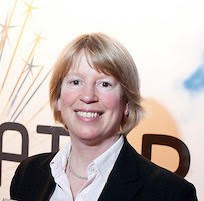 Professor Downes has a national and international reputation in the field of inherited retinal dystrophies (IRD) with over 30 years of research and working in the field. The subject of her Medical Doctorate was inherited cone and cone rod dystrophies, and she described the phenotype genotype correlation in a novel gene (*GUCA1A*) the first purely cone dystrophy gene to be reported at that time. Since then, she has published numerous papers in IRD phenotype genotype correlation, working in collaborations across the UK and internationally, which have contributed significantly to the knowledge in this field. In recognition of this she was listed in the European Vision Institute’s top excellent Women in research in 2021 and received a leadership award from the Nuffield Department of Clinical Neuroscience for her contributions in 2023.
Professor Downes has a national and international reputation in the field of inherited retinal dystrophies (IRD) with over 30 years of research and working in the field. The subject of her Medical Doctorate was inherited cone and cone rod dystrophies, and she described the phenotype genotype correlation in a novel gene (*GUCA1A*) the first purely cone dystrophy gene to be reported at that time. Since then, she has published numerous papers in IRD phenotype genotype correlation, working in collaborations across the UK and internationally, which have contributed significantly to the knowledge in this field. In recognition of this she was listed in the European Vision Institute’s top excellent Women in research in 2021 and received a leadership award from the Nuffield Department of Clinical Neuroscience for her contributions in 2023.
Downes set up the Eye Research Group Oxford (ERGO) in 2008, now a 20 member multidisciplinary team, for which she is lead. ERGO provides support for all the clinical trials in the Oxford Eye Hospital as well as collaborating closely with the vision scientists within the University, and international collaborations. In recognition of this initiative Downes received a Gold Award for Leadership and Innovation from the Oxford University Hospitals NHS Foundation Trust in 2014.
She is a regular presenter at patient support groups on age related macular degeneration. She set up Oxford as one of the three UK Centres for the European Reference Network for Rare Eye Diseases (ERN) and has recently set up the Kellogg Oxford Eye Centre with a remit for research and education into visual impairment, which is due to be launched in June 2025. Downes and other IRD specialists set up a collaborative research consortium in 2011, to enable collaborative research across the UK, called the United Kingdom Inherited Retinal Disease Consortium (UKIRDC), which has been highly successful. In addition to her specialist interest in inherited retinal disease, she led the Medical retina Service at the Oxford Eye Hospital from 2000 until 2021. She has been involved in the design of several clinical trials, as well as chair of the steering group for these.
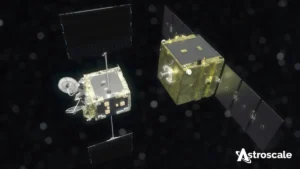 One of the first companies in the world to focus on space sustainability, Astroscale has been working for over a decade on developing technologies to remove space debris and enable a circular economy in space. This talk will present how they go about removing debris from Earth’s orbits and creating a safer and more sustainable space environment, along with the latest technology and mission developments that Astroscale has been flying and working on.
One of the first companies in the world to focus on space sustainability, Astroscale has been working for over a decade on developing technologies to remove space debris and enable a circular economy in space. This talk will present how they go about removing debris from Earth’s orbits and creating a safer and more sustainable space environment, along with the latest technology and mission developments that Astroscale has been flying and working on.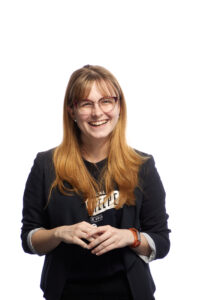 Zoé is a senior engineer at Astroscale, who has been working for the past 5 years on space debris removal missions, developing concept of operations and spacecraft design for rendezvous and proximity operations. She previously worked on Earth observation missions at Airbus.
Zoé is a senior engineer at Astroscale, who has been working for the past 5 years on space debris removal missions, developing concept of operations and spacecraft design for rendezvous and proximity operations. She previously worked on Earth observation missions at Airbus.


